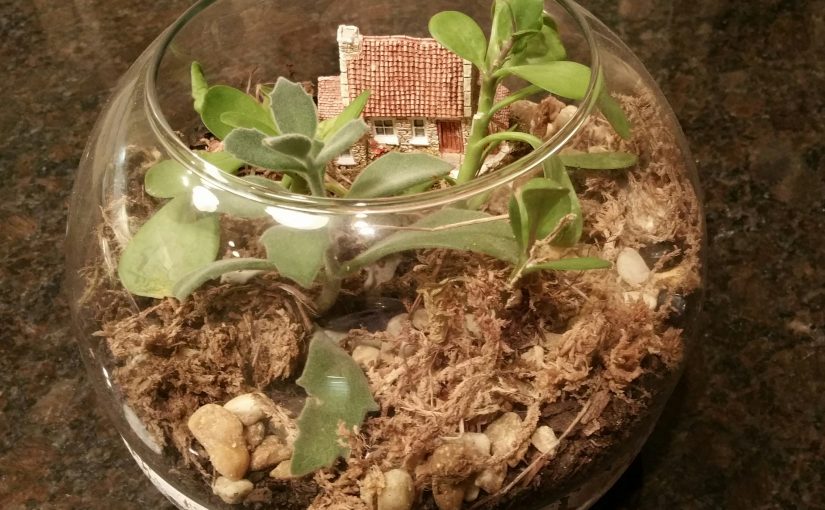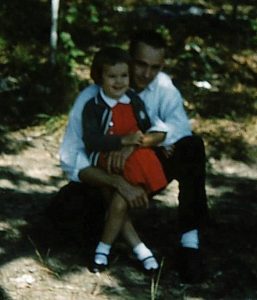My terrarium is a joy. Houseplants that require a drop of water every couple of months can flourish under my care. I’ve managed to keep a peace lily and a Christmas cactus limping along for over a decade, and an aging philodendron languishes in the basement, but they haven’t grown in a while now, and I realize that such existence is not natural. It isn’t that I don’t love my houseplants, for I love most living things (notable exceptions being poison ivy and Japanese beetles). I merely forget to water them.
Forget is not the correct term. I know plants require water and I see them every day. Time races by so fast, however, that when I see the peace lily drooping and gasping, I ask, “Didn’t I just water you day before yesterday?” If I was a planner, I might have a monthly checklist that orders me, “Water houseplants every Tuesday,” and I would cross out the assignment and know if it had been several Tuesdays since the wilting lily and the patient philodendron had a drink.
Unfortunately, I was born with the genetic defect “Planning Deficit Disorder,” or PDD. I cannot accommodate, much less control, future events. Now is all there is. Although PDD mystifies (or more often exasperates) planners around me, the condition is not all bad. One has up-to-the-minute flexibility, and unpleasant tasks and decisions can be delayed indefinitely. Folks with PDD are able to save a lot of time, or at least devote that time to what we want to do now. Once I saw a greeting card that said, “If you wait until the last minute, it only takes a minute to do.” I snatched up the card to give to the daughter who inherited the PDD gene from me. She opened it at her birthday party twenty minutes later, and loved it. We often share this truth with frustrated planners who are pressing us for action when it is far too early to be thinking about anything but the problems and opportunities of now. But enough about my PDD- I realize other people’s medical and psychological issues are not nearly as fascinating as one’s own.
In my thriving terrarium, I placed a miniature English cottage- one of those trinkets that someone somewhere probably collects, but in my hands seems to have no origin or purpose. “Where did I get this? What do I do with it?” Too nice to toss in the trash, to useless to give away, this humble bit of clutter found meaning as a fairy house nestled among the succulents.
My favorite six-year-old immediately noticed the addition. “You put a little house in here!”
“Yes, I did!”
“What if a fairy came to live in it?”
“Do you think one might come?”
“No, because she can’t open the door.”
Ah, the yawning chasm between imagination and cold, hard facts. I had a conversation once, when I was about six, with my daddy, the parent from whom I inherited the PDD gene. A kid in the neighborhood had made the outrageous allegation that the tooth fairy was not real. He claimed he had proof. He scoffed at fairies in general and even doubted, (stopping short of complete denial), the existence of Santa Claus. Was his heresy to be believed? Had I been duped? Was the magical world of tiny, laughing, winged girls and boys singing and dancing in the flowers all a lie? It seemed that something rare, fragile, and beautiful, like Tinkerbell, was fading – hovering on the brink of death. I determined to ask my daddy. He was the smartest person I knew, an unfailing bulwark in crisis, and I was sure that he believed in fairies, because he told me stories about them. I was waiting when he pulled in the driveway and opened the door of his pickup truck.
“Are fairies real, Daddy? David says they aren’t. Not even the tooth fairy.”
What does a hard-working father do when he comes home after a long day in the gritty world of the small-town, family-owned home and auto store of the 1960’s- a real, hard world of sales tickets and credit applications, finance plans, accounts payable, and tire changes? He expects a kiss and a hot supper, but instead faces an impossible question from a tender, imaginative child who must inevitably grow up, whether he is ready or not. I am quite certain my father did not plan for this important moment. Now is all there is, you know. He answered from his heart and his own experience.
Kneeling, Daddy looked into my eyes. “Well, Debbie, fairies may be real; and they may not. But isn’t it more fun to think that they are?”
Imagination and hard facts can live happily ever after, with the right amount of water. Too much rots the roots and too little hardens the ground and withers the leaves. A lot of truth can bloom in a story, and the world of imagination is a lovely place to visit, as long as we remember where the boundaries lie and we know when it is time to come home.
“Yes, Daddy, it is more fun. And Zoe, if she can’t open the door to the fairy house, perhaps she could fly in the window.”



